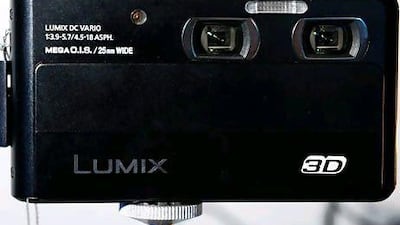After the acquisition of Sanyo, the Japanese cameras and televisions giant expanded its portfolio of products. The company says its wide range of goods that includes irons, vacuum cleaners and shavers is one of its strengths. But challenges remain, Neil Parmar writes
Mention the brand Panasonic and images of cameras and big-screen televisions come to mind.
Yet when the Japanese manufacturer that acquired Sanyo in 2009 hosted a product showcase last month in Abu Dhabi, innovation across a broad range of products was the name of the game.
There was, as expected, a full line-up of televisions, including the world's biggest plasma model with a 152-inch screen.
But walking around the room was akin to browsing for goods at a high-tech car-boot sale, as on display were a new series of vacuum cleaners, air conditioners and clothes irons.
There was even a five-blade electric shaver for men, which was submerged in a see-through vat of water to prove that it could be used while in the shower.
"There are very few competitors that have the entire portfolio of products we have," says Anthony Peter, the director of the customer care and direct communications group at Panasonic for the Middle East and Africa.
Convincing shoppers to purchase these different products, however, has been an increasingly tough sell amid growing competition.
Earlier this year, Panasonic's shares fell to their lowest level in more than three decades following a warning it would lose more than US$9 billion (Dh33.05bn) this year.
Here, Mr Peter discusses what is ailing the 94-year-old technology company and its new strategy.
What is hurting most at Panasonic and how do you turn it around?
Basically, we have acquired Sanyo. When we acquire certain things we have to make drastic changes and we need to incorporate all those [business areas] into our current [markets]. That is shown by the sort of loss we've been taking. We have reorganised the entire business structure.
How has that been done?
We have made it slimmer with two major categories. They are appliance and audio/visual [AV]. In appliances, we used to have many sectors. Now, they have all been grouped together as one.
Panasonic has a wide portfolio of products. Is there a danger of being too broad?
I think it's our strength. Having a long tail of products helped us. We don't put all our eggs in the same basket, which is probably happening to a lot of the competitors.
What are you trying to avoid within your business strategy?
We don't want to get into price competition. It's a very price-sensitive market. Even if you want to give consumers something good, they still compare the prices. We go for quality, mid-priced products [that are] maybe a little more expensive, but eventually in the long run will save energy. We don't want to be [everything for] everybody. That's not something which we have to be.
Panasonic's television division has been blamed for the company's weaknesses. Last year, your television sales forecast was downgraded by 1 million to 18 million. How do you turn this around when there is so much competition in this market?
If you've seen the new line-up, it's totally changed. I'm really encouraged. What's your reaction?
To be honest, a lot of the apps on Panasonic's latest smart televisions are similar to ones out there by companies such as Samsung and Sony.
Most of the TVs have it. But now … none of our competitors [have what] we're trying to introduce: the world's first touch-panel remote. Obviously this is just the beginning. Later on, you'll swipe things - like a tablet. That is an [example] of what you can do for consumers.
What is Panasonic's strategy for creating new products?
You need to give consumers things they will like to use. [Providing] features, and adding on prices without consumers using it, makes no sense. It's not something [where] you create technology for the sake of technology. Don't give something that people aren't ready to take. Go along with the market.
Of course, we [have some] "world's firsts" - the world's first mirrorless cameras. We invented it … now all the big players are coming. Where there is a necessity, we will definitely [be first]. It's not for the sake of being number one.
With smart televisions, though, is it the right strategy to follow the market and not be the first to innovate?
We are talking as a company: we're taught that [smart TVs are] going to be interactive. How many of us actually use it as an interactive tool? All of our TV ranges are "smart" … but you [need to] tell the customer this will help you in x, y, z. As a company we need to educate.
twitter: Follow and share our breaking business news. Follow us
iPad users can follow our twitterfeed via Flipboard - just search for Ind_Insights on the app.

